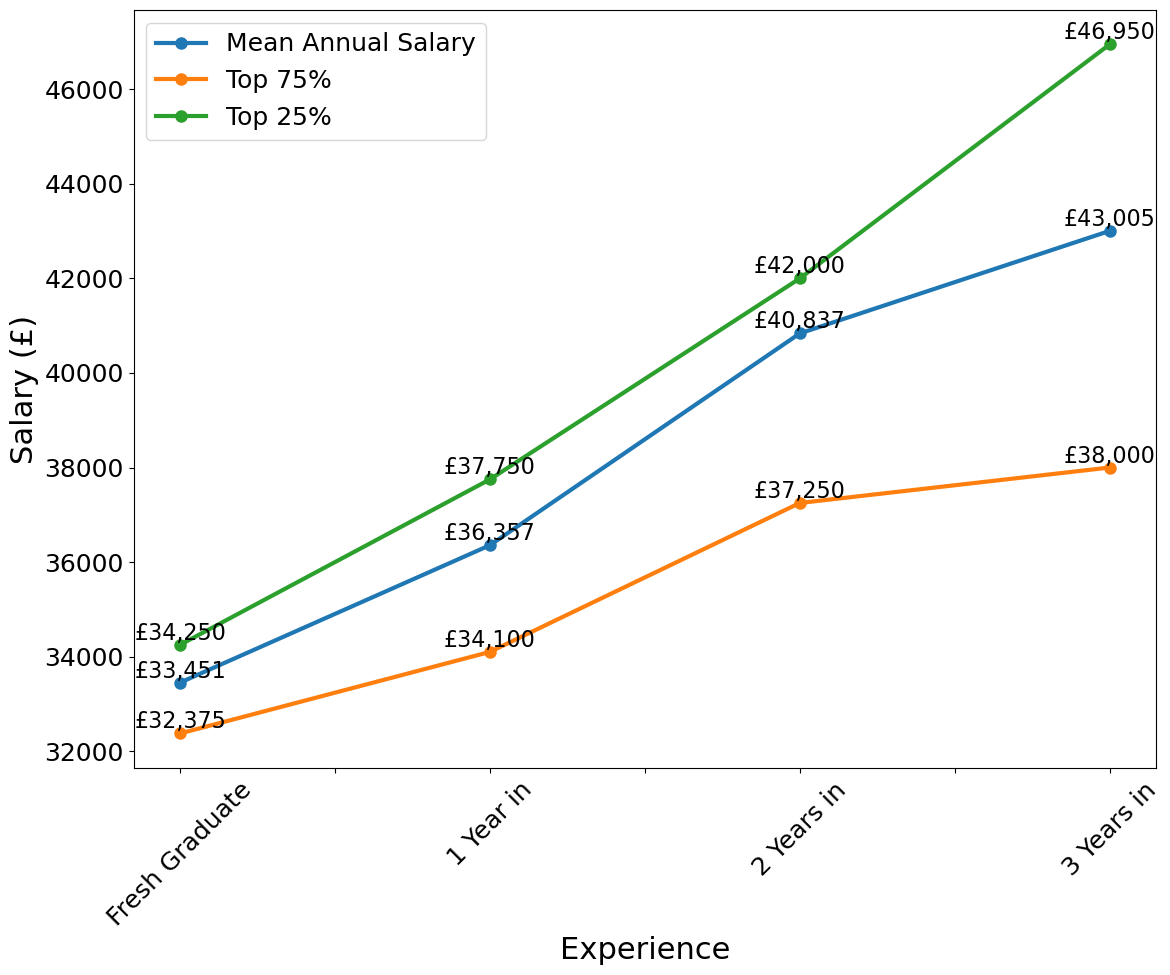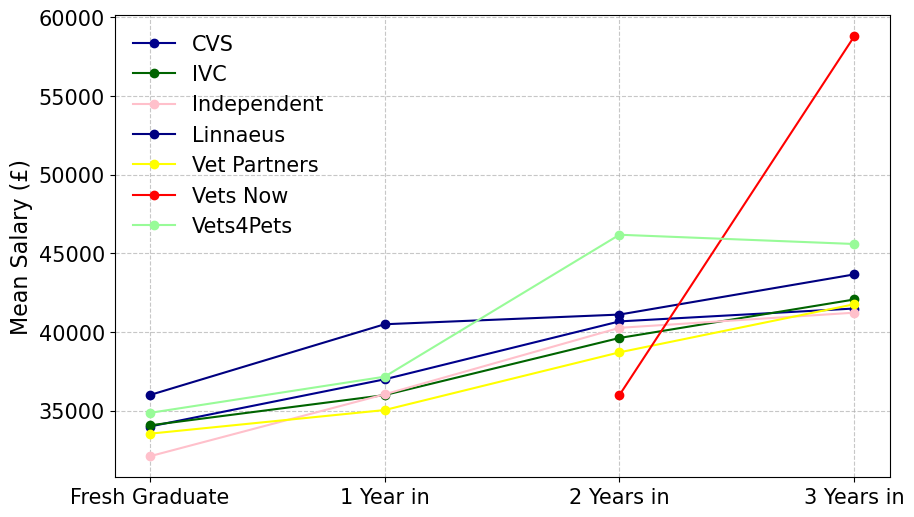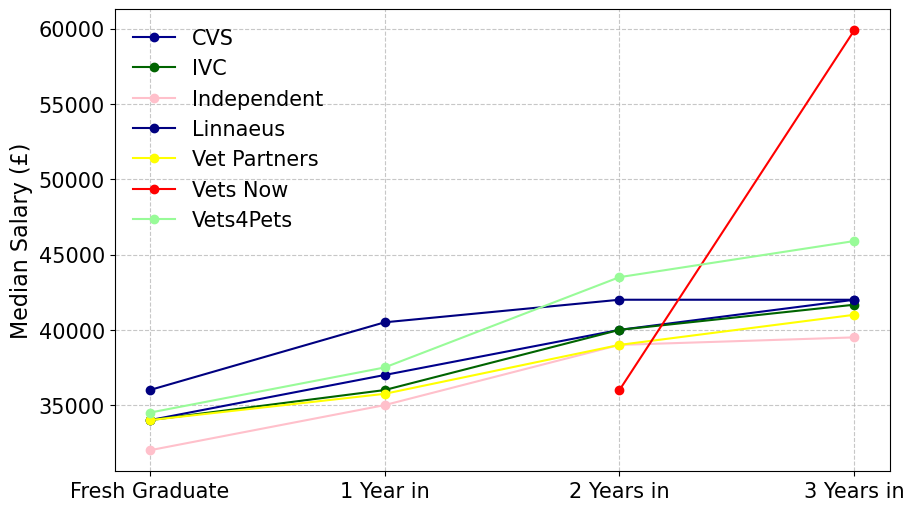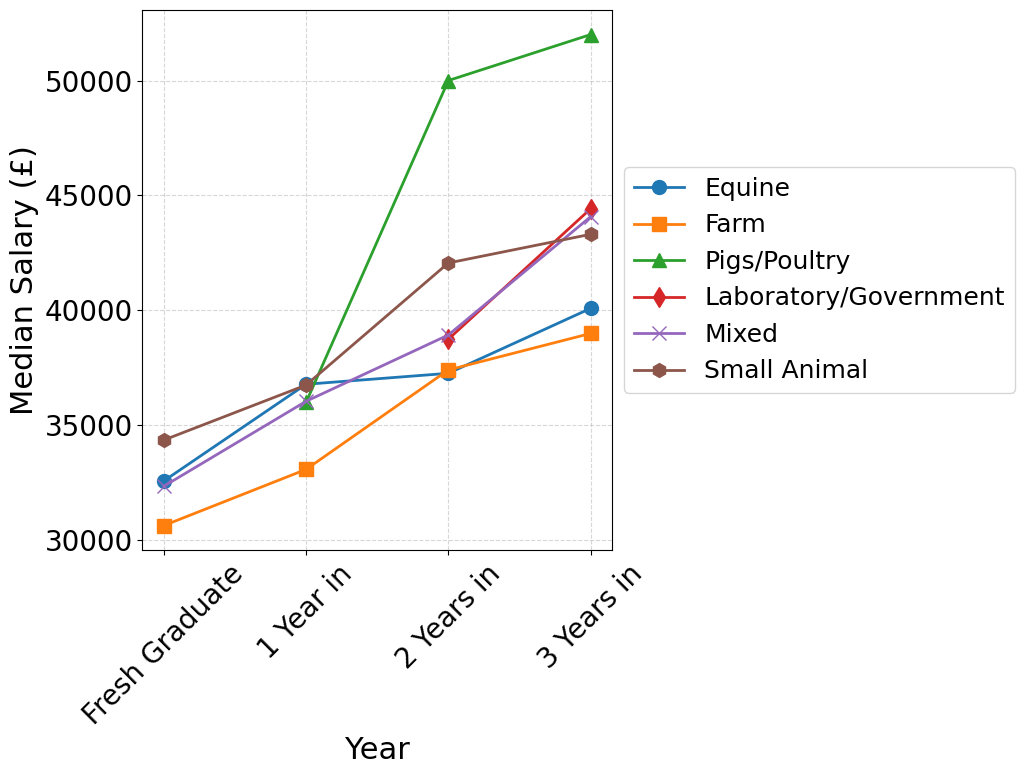What Is a Vet Salary in the UK (2024)?
This is a comprehensive guide to full-time Vet Salaries in the UK, based on an anonymous survey conducted in 2023, filled out by approximately 400 vets. Whether you’re considering a career as a veterinarian or are a practicing vet looking to benchmark your salary, this article provides valuable insights into current remuneration trends in the veterinary field across the United Kingdom.
Sections
Mean Vet Salary UK

As a table:
| Experience | Mean Annual Salary | Top 75% | Top 25% |
|---|---|---|---|
| Fresh Graduate | £33,451 | £32,375 | £34,250 |
| 1 Year in | £36,357 | £34,100 | £37,750 |
| 2 Years in | £40,837 | £37,250 | £42,000 |
| 3 Years in | £43,005 | £38,000 | £46,950 |
Fresh Graduate
The mean annual salary of a fresh graduate was £33,451, with the top 75% of the highest-earning participants making over £32,375 and the top 25% making over £34,250.
1 Year in
Naturally, with experience, the salaries grow by around 10% each year. The mean annual salary of a vet with 1 year of experience was £36,357, with the top 75% of the highest-earning participants making over £34,100 and the top 25% making over £37,750.
2 Years in
The mean annual salary of a vet with 2 years of experience was £40,837, with the top 75% of the highest-earning participants making over £37,250 and the top 25% making over £42,000.
3 Years in
The mean annual salary of a vet with 3 years of experience was £43,005, with the top 75% of the highest-earning participants making over £38,000 and the top 25% making over £46,950.
More Years in
It is expected that the increasing trend in salaries will start to level out after the initial three years. This is because most vets will have gained enough experience by then to be independent and to become full-value members of the team. The next significant salary jump typically occurs when a vet is promoted to a more senior role, such as head surgeon. Additionally, reporting the salary in later years can become more challenging as the group becomes less coherent, especially when compared to new graduates.
Salary Small Animal Vet
Mean Salary Small Animal Vet
For the majority of our readers, the comparison of salaries between corporate and independent practices will likely be the most interesting aspect.

| Practice | Fresh Graduate | 1 Year | 2 Years | 3 Years |
|---|---|---|---|---|
| CVS | 34,000 | 37,000 | 40,681 | 41,500 |
| IVC | 34,075 | 35,998 | 39,628 | 42,074 |
| Independent | 32,110 | 36,046 | 40,273 | 41,235 |
| Linnaeus | 36,000 | 40,500 | 41,115 | 43,668 |
| Vet Partners | 33,545 | 35,047 | 38,715 | 41,772 |
| Vets Now | - | - | 36,000 | 58,800 |
| Vets4Pets | 34,867 | 37,167 | 46,188 | 45,600 |
It is interesting to note that the salaries are fairly similar across the board, with only the Linnaeus group slightly leading in all experience groups.
Median Salary Small Animal Vet

| Practice | Fresh Graduate | 1 Year | 2 Years | 3 Years |
|---|---|---|---|---|
| CVS | 34,000 | 37,000 | 40,000 | 42,000 |
| IVC | 34,000 | 36,000 | 40,000 | 41,670 |
| Independent | 32,000 | 35,000 | 39,000 | 39,500 |
| Linnaeus | 36,000 | 40,500 | 42,000 | 42,000 |
| Vet Partners | 34,000 | 35,750 | 39,000 | 41,000 |
| Vets Now | - | - | 36,000 | 59,900 |
| Vets4Pets | 34,500 | 37,500 | 43,500 | 45,900 |
The median salary, which is less skewed by outliers, reinforces the position of the Linnaeus group at the forefront of salary offerings for small animal vets.
Mean Salary Based on Field

| Type | Fresh Graduate | 1 Year | 2 Years | 3 Years |
|---|---|---|---|---|
| Equine | 40,091 | 37,266 | 36,789 | 32,583 |
| Farm | 39,000 | 37,413 | 33,086 | 30,643 |
| Pigs/Poultry | 52,000 | 50,000 | 36,000 | - |
| Laboratory/Government | 44,425 | 38,750 | - | - |
| Mixed | 44,078 | 38,933 | 36,048 | 32,353 |
| Small Animal | 43,313 | 42,065 | 36,755 | 34,362 |
It is revealing to see that vets specializing in Pigs/Poultry typically commanded higher wages, while Equine and Farm vets generally reported lower salaries.
Conclusion
We hope this analysis of vet salaries in the UK has provided you with a clearer picture of the current state of compensation in the veterinary field. It’s important to remember, however, that while salary is an important factor, it shouldn’t be the sole consideration. Opportunities for learning, professional growth, and the quality of the work environment are equally crucial to forming a rewarding career.
The original survey was authored by James Morland and Esme Chapman. The data presentation and graphs were made by the team at ❤️ Vetjobhunt.uk